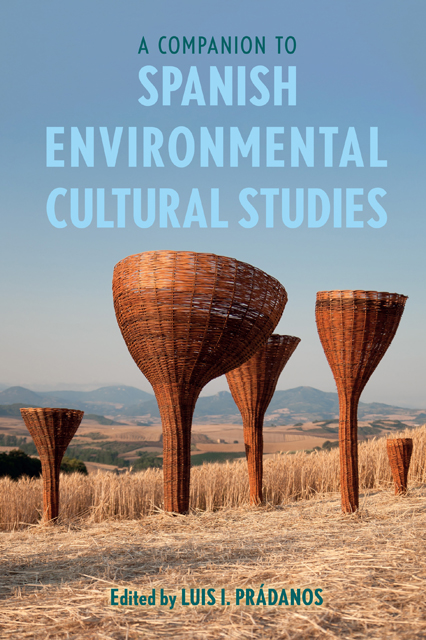Book contents
- Frontmatter
- Contents
- List of Illustrations
- List of Contributors
- Note on the Translations
- Acknowledgements
- Introduction: Spanish Environmental Cultural Studies
- Part I Environmental Cultural History and Political Ecology
- Part II Water and Power
- Part III Ecologies of Memory and Extractivism
- Part IV Animal Studies and Multispecies Ethnographies
- Part V Food Studies and Exploitative Ecologies
- Part VI Ecofeminism
- Part VII (Neo)Colonial and Racialized Ecologies
- Part VIII Tourism and the Environmental Imagination
- Part IX Eco-Mediation and Representation
- Part X Trash and Discard Studies
- Bibliography
- Index
18 - From Pleasant Difference to Ecological Concern: Cultural Imaginaries of Tourism in Contemporary Spain
Published online by Cambridge University Press: 08 June 2023
- Frontmatter
- Contents
- List of Illustrations
- List of Contributors
- Note on the Translations
- Acknowledgements
- Introduction: Spanish Environmental Cultural Studies
- Part I Environmental Cultural History and Political Ecology
- Part II Water and Power
- Part III Ecologies of Memory and Extractivism
- Part IV Animal Studies and Multispecies Ethnographies
- Part V Food Studies and Exploitative Ecologies
- Part VI Ecofeminism
- Part VII (Neo)Colonial and Racialized Ecologies
- Part VIII Tourism and the Environmental Imagination
- Part IX Eco-Mediation and Representation
- Part X Trash and Discard Studies
- Bibliography
- Index
Summary
A key scene in the film El verdugo (The Executioner) by Luis García Berlanga shows the main characters in the Drach Caves of Mallorca – a time-honored site for the tourist usage of the island’s natural heritage – just when a member of the Spanish Civil Guard (Guardia Civil) instructs the main character, an executioner, to do his job and execute a prisoner. From the camera’s perspective, the magnificent site of the cave serves a dual purpose. On the one hand, it is an allure that conveys the island’s beauty, beckoning a peaceful visit; on the other, it is the stage of a moral conflict. Hence, the site is a framework for both tourism promotion and the critique of the dictatorial regime that governs such promotion. Cultural presentations of nature at tourism sites are never gratuitous or unambiguous. They generate a point of view that affects not only the tourist gaze, but also the reproduction of the manner in which the space is perceived and socially used by the local residents.
In this chapter, we analyze the intersection between tourism, culture, and the natural environment in Spain from a perspective that takes in the historical processes, as well as the diverse cultural practices and products involved. Beyond confirming the difficulty of defining the connoted limits among the three categories under study (for example, the difference between a tourist and a traveler, between culture and tourism consumption, between environment and natural setting), this study explores the manner in which their intersection generates a complex conceptual network that also determines the definition of other key terms such as landscape, heritage and even progress. Moreover, it fosters the normalization of terms of habitual use in this field – natural monument, rural tourism, green tourism, ecotourism – that can sometimes be conceptually antithetical. For this reason, we are not only interested in analyzing the cultural products of tourism and their imbrication in the natural environment, but also the semantic shifts among the places where the three categories are conceptualized. We postulate that in Spain, those shifts have materialized throughout history in at least three directions that are linked to the ideological planning of the land, the commercialization of the natural setting, and the overlapping between cultural and tourism practices.
- Type
- Chapter
- Information
- A Companion to Spanish Environmental Cultural Studies , pp. 195 - 205Publisher: Boydell & BrewerPrint publication year: 2023



